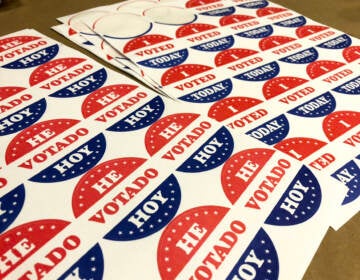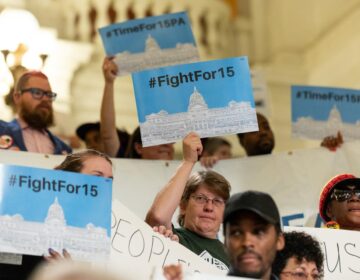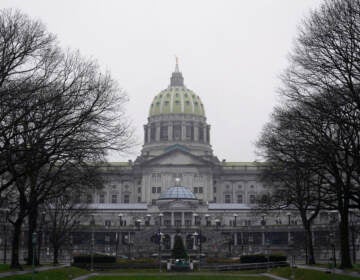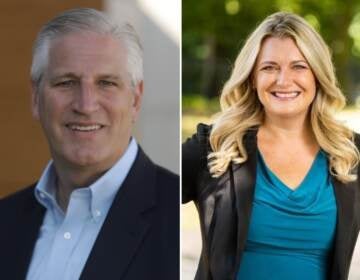How are Pa.’s biggest political campaigns reaching Latino voters?
This is the time when campaigns start to engage Latino voters — usually in a last ditch effort to curry the favor of a group that often feels left out of the electoral process
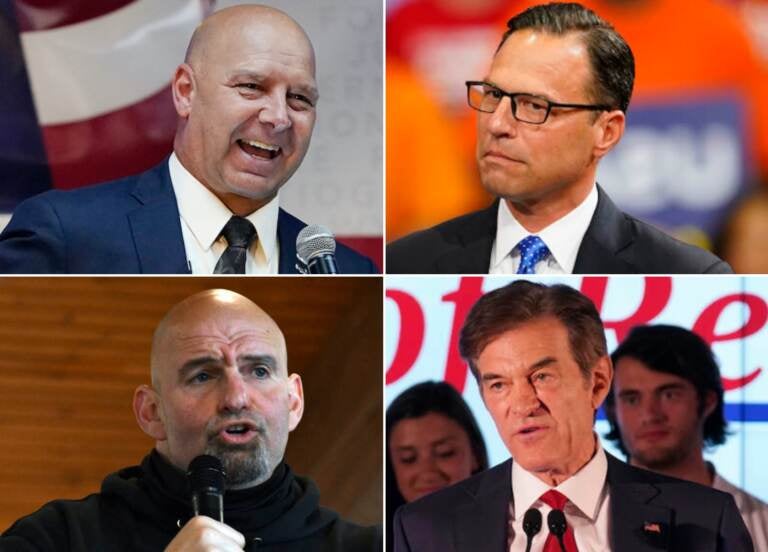
From top left clockwise: Doug Mastriano, Josh Shapiro, Mehmet Oz, John Fetterman (AP Photos)
Ask us: As Election Day draws near, what questions do you have?
Lea esta historia en español aquí.
Pennsylvania is heading into the home stretch of the November election with two major races at the top of the ballot: one to choose the next governor, and another to fill the open U.S Senate seat.
In Pennsylvania and across the nation, this is the time when campaigns start to engage Latino voters — usually in a last ditch effort to curry the favor of a group that often feels left out of the electoral process.
We reached out to the gubernatorial campaigns for Josh Shapiro and Doug Mastriano, as well as the Senate campaigns for Mehmet Oz and John Feterrman to learn more about if and how they’re connecting with Latino voters in Philadelphia and beyond.
Latinos are the fastest-growing demographic in Pa., but recent UnidosUS poll of 300 households across the commonwealth found that as of August last year, over half of registered Latino voters hadn’t received any outreach around the general election. Specifically, 30% received information from Democrats, 15% from Republicans, and 13% from nonpartisan groups.
That same survey found voters of Latino heritage are most animated around issues like rising inflation, gun violence and public safety, racial justice, and abortion — essentially the same as Pa. voters overall.
“It’s easy to say, ‘Look, we’re addressing immigration, and that’s the only thing we have to address,’” Jones-Correa, a political science professor at the University of Pennsylvania who studies Latino voting behavior, told WHYY News and Billy Penn. That isn’t a concern all people in Latino communities have, he noted.
Vanessa Graber is a media policy advocate and an organizer with Philly Boricuas, a nonpartisan grassroots group mobilizing Philly Puerto Ricans to vote on policies that would benefit the island. She cautioned political campaigns to not treat Latinos as a monolith.
“There are people from over 20 Latin American countries represented here in Philadelphia, and each community has its own distinct needs and political point of view,” Graber said, pointing to the debate over Puerto Rican sovereignty as an example. “Even though there’s a shared language and some shared culture, politically, we are very, very different.”
For Graber, this lack of genuine engagement is contributing to disillusionment among voters in Northeast Philadelphia, where she canvasses, who believe federal and state policy decisions don’t help their neighborhoods, where trash pickup, crime, and gentrification are top of mind.
“At least half the people we talked to while we were doing outreach … said ‘We’re not going to vote because nothing changes,’” Graber said. “I think candidates and political parties need to show progress to people.”
How the candidates for governor are reaching Latino voters
Both Republican Mastriano and Democrat Shapiro have used public appearances to reach Latino voters, though Shapiro started earlier and has connected with the population more frequently.
At the end of September, Mastriano held his first public campaign event in Philadelphia. His campaign deemed the event Philadelphia’s first Hispanic Town Hall.
Hosted by the Small Business Union, the event was predominantly met with angry community members, Shapiro campaign surrogates, and fierce protests aimed at his views on abortion rights among issues. The state senator focused most of his attention on crime, according to The Philadelphia Inquirer. While some might see Mastriano’s visit as a viable attempt to reach out to Latino voters, experts believe this strategy does not fall in line with best practices — in terms of messaging and authenticity.
Neither Mastriano nor his campaign responded to a request for comment.
Shapiro’s campaign website has been available in Spanish since the day he launched his bid for governor in October 2021, according to spokesperson Will Simons. The state attorney general made trips to Allentown and Reading — which have the largest concentration of Pennsylvania’s Latino residents — during his first week of campaigning. (Mastriano has also visited Allentown, though it came later in his tour across the state.)
Over the summer, Shapiro made appearances in Philadelphia dedicated to speaking with Latino business owners and clergy.
“Our campaign has made significant investments to reach Latino voters where they are — at their doorsteps, online, on the radio, and in communities all across Pennsylvania,” Simons said.
Shapiro’s campaign has spent over $500,000 on digital and radio advertisements targeting Latino voters, per Simons. On top of that, Shapiro has made several appearances on La Mega’s “El Relajo de La Mañana,” a popular Spanish-language radio show broadcast from Reading.
Shapiro recently spoke at a CASA in Action rally in York — alongside Pennsylvania’s second lady Gisele Fetterman and a Spanish translator — about investing in public education, safe neighborhoods, and small businesses. He also talked about the things that he said matter most to him — his family and his faith.
“No matter what you look like, where you come from, who you love or who you pray to, I want to be your governor,” Shapiro said. His words were met with cheers of “sí, se puede” and “yes, we can.”
How the Senate candidates are reaching Latino voters
In the race for Pennsylvania’s open U.S. Senate seat, Fetterman may appear to have done more concrete outreach than Oz. However, Philly Boricuas’ Graber said, he’s not necessarily doing the right kind.
The Fetterman campaign cited the lieutenant governor’s appearance at Reading’s Puerto Rican Day Parade in September and his endorsements from CASA and CHC BOLD PAC, the fundraising arm for the Congressional Hispanic Caucus, as examples of his dedicated outreach.
Additionally, his campaign said that his background as an advocate for a $15 minimum wage, unions, a “compassionate” immigration system, and codifying the right to vote speak to his support for the Latino community.
Fetterman’s wife Gisele, who is Brazilian, has also been at the forefront of the campaign’s push to reach Latino voters. She has narrated Spanish radio ads, and led a June rally against Pittsburgh’s immigration court closure alongside advocacy group Casa San Jose and representatives from the American Immigration Lawyers Association. Without the court, thousands of families in western Pennsylvania and West Virginia were forced to travel to the second nearest one in Philadelphia.
Jones-Correa, the Penn political science professor, said Gisele Fetterman’s Spanish-language work “probably helps” and is “not just symbolic.” But Graber said the campaign should go further to forge relationships with voters.
“I think the work she’s doing is valuable, I just don’t think it’s enough,” Graber said. “A Brazilian woman from Western Pa. is not relatable to everyone.”
Graber also said she thinks Fetterman’s campaign is overstating his recognition and impact.
“I don’t think the average person in North Philadelphia knows who John Fetterman is,” Graber said, speaking about the constituents she works with. “I feel like he is just relying on the Democratic reach and power that already exists.”
The Fettermans plan to conduct a series of bilingual Latino radio call-ins, according to the campaign, where they will directly speak to and urge people to vote on Election Day.
Over on the Oz campaign, the celebrity doctor spent part of Hispanic Heritage Month in Allentown to tour Latino-owned businesses.
“Dr. Oz will fight for hispanic families in the U.S. Senate, and he will work to implement solutions that will create a stronger, safer, and healthier Commonwealth for everyone,” campaign spokesperson Brittany Yannick said, stressing that the Senate candidate has made it a priority to reach out to the Latino community.
In July, Oz made a visit to Allentown to speak at the Hispanic Community Center, and in September, he visited Philadelphia’s Kensington neighborhood to speak with Black and Latino business owners.
However, hiss engagement with Latino voters doesn’t have much of a digital footprint.
We had a full house for our meet and greet today in Allentown at the RNC Hispanic Community Center. The energy and enthusiasm is growing each day! pic.twitter.com/BHh7LeoQ1O
— Dr. Mehmet Oz (@DrOz) July 22, 2022
Graber said she hasn’t seen very many Puerto Ricans enthusiastic about voting for Oz, except people with deep ties to evangelical churches who may cast votes around a single issue: abortion.
Anti-abortion rhetoric has become a cornerstone of Oz’s platform. The Republican candidate has said he believes “life starts at conception” and supports the Supreme Court’s overturn of Roe v. Wade, but will not back criminal penalties for patients who seek the procedure and doctors who perform them.
Editor’s note: Updated Oct. 24 to amend the description of the Philly Boricuas organizer’s job.

Your go-to election coverage
WHYY is your source for fact-based, in-depth journalism and information. As a nonprofit organization, we rely on financial support from readers like you. Please give today.


